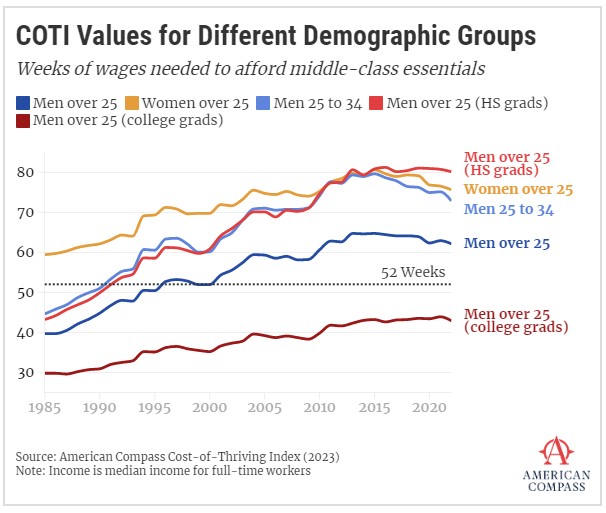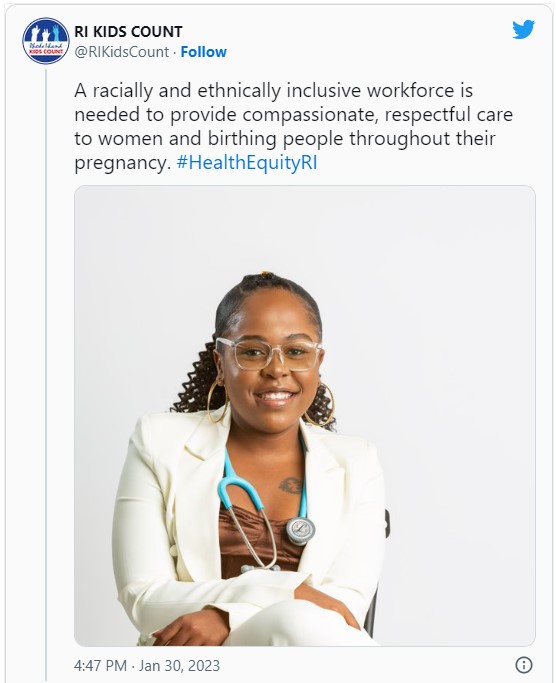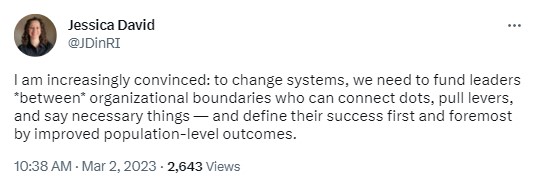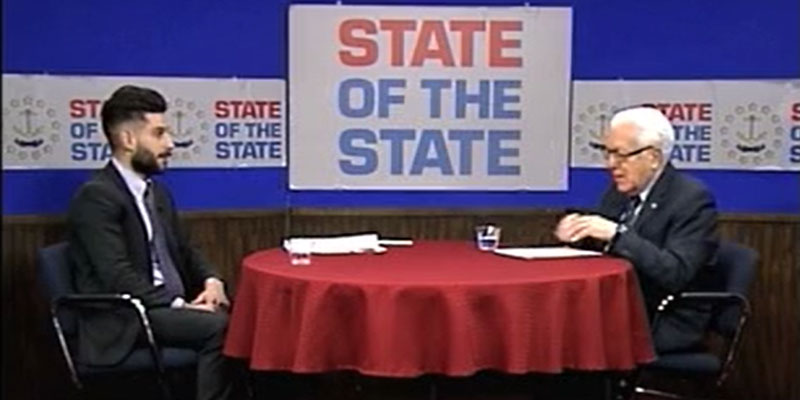Oren Cass’s analysis of the weeks required to support a middle-class lifestyle for American Compass raises some interesting points. The study focuses on the income of men and shows that the combined cost of food, housing, health care, transportation, and education surpassed the median male income in the mid-’90s. By 2022, that income was about 20% shy of the mark. Americans have to work more weeks than there are in a year to cover a year’s expenses.
Given the focus on male stagnation, one might expect Republicans to be particularly sensitive to this problem in the midst of culture wars, but the emphasis goes the other way. Among Democrats, 41% “strongly agree” the shortfall is a big problem, whereas only 25% of Republicans say the same. The interesting aspect of this finding, though, is the factors that might account for it. For one thing, a chart of the number of necessary work weeks by state suggests that, generally, Republicans are more likely to live in states where the inability to afford essentials is genuinely less of a problem, whereas Democrats are more likely to live in states where it’s a massive problem.
If that answer is a bit too technical for your tastes, consider also that the question was part of a broader survey, so the order of the questions may primed both Republicans and Democrats to see the question in terms of welfare rather than work. Evidence for this proposition can be found in a chart asking, “Is Economic Pressure to Have Two Working Parents a Big Problem?” Republicans were more likely than Democrats to answer “big problem,” even though it’s arguably another way of asking the same question.
This chart, which is the only one to bring women into the picture, illustrates another interesting finding:

The key point of which we shouldn’t lose sight is that only male college graduates still make enough money to support a family. (Data for female college grads isn’t shown, so we can’t compare.) The three other lines for men — high school grads, those aged 25-34, and the average for those over 25 — were able to make ends meet in the ’80s but no longer can.
Because they’ve lost ground less quickly, the average for all women over 25 caught up with that for male high school grads and early-career men about a decade ago. Since then, the male high school grads have seen no improvement, while the average for women has more or less tracked with early-career men in making up some of the lost ground.
We aren’t given the data for women who are only high school grads, but the fact that women now outnumber men by big percentages in college makes it likely they’re faring better than their male peers. We also have to account for the fact that the discrepancies of the past are still with us. That is, the overall average for men and women remains skewed by the way things were 30 or 40 years ago.
This particular dataset is insufficient to justify broad proclamations, but we’re on safe ground to offer that America has problems that need quick reactions.
Featured image by Adraien Van De Venne.
[Open full post]You can watch it happening in particular with advocacy organizations. Where once they had very specifically defined missions — like RI Kids Count keeping track of information about children in the state of Rhode Island — that mission becomes merely a mild flavor differentiation from every other progressive organization. Witness:

The divisive racism is bad enough, but it’s a dire warning sign when ostensible advocates for children can’t even acknowledge the existence of women and, specifically, mothers.
[Open full post]With Lawrence, MA, as my inspiration, I described what I’ve since come to call the “company state” or “government plantation.” Just as big companies used to set up “company towns” which existed mainly to serve the companies, now governments are becoming the central industry and animating force of the regions under their control. Their model is to find clients for their services and then collect money from others (whether within or outside of their jurisdiction) to cover the cost.
Unsurprisingly, just like businesses, governments are forming cartels to ensure the people whose money they harvest can’t easily escape their influence:
State legislators from California, Connecticut, Hawaii, Illinois, Maryland, Minnesota, New York, Oregon, and Washington announced a coordinated set of bills to hike taxes on wealthy individuals, families, and businesses. The purpose of coordinating is to try to keep these taxpayers in their respective states by making it seem like crushing taxes are inevitable wherever they move.
We can predict this won’t work (certainly in the long run), but the most important point is that it’s plainly immoral and beyond the bounds for representative governments of free people.
[Open full post]An omission in Asher Lehrer-Small’s recent article about reforms spearheaded by the state Department of Education puts a spotlight on the reason I’m skeptical and fear the changes are yet another cover-up of incompetence that will put Ocean State students even farther behind. The reasonable hook is this head-scratching finding of a problem that should be relatively easy to fix:
While about 80 percent of students said they wanted to attend college, just 60 percent enrolled in the courses necessary to be eligible for higher education, and only about 50 percent passed those classes. …
In many cases, high schoolers would sign up for classes and have no idea that their selections could disqualify them from access to higher education, [Education Commissioner Angelica] Infante-Green explained.
Yet, the most-concrete solution described in the article is this:
The new regulations also add flexibility for students who work or are caregivers, so they can receive credit for their real-world learning experiences. The changes will eliminate seat time in the classroom from being a criteria used to award academic credit, placing the emphasis instead on subject mastery and student proficiency.
The reason I’m skeptical of such changes, as reasonable as they may sound, is that they put the power of subjective judgment in the hands of a system that is already utterly failing and that has both strong incentive and immense power to avoid holding an adequate line. A school system that is failing to educate students has many reasons to paper over that failure by granting credit for student activities that have nothing to do with the system. At least seat time is measurable and puts the responsibility for education squarely in the classroom.
The problem runs even deeper, though. Nowhere in the article do we see a term at the center of students’ mismatch between intentions and class selection: guidance counsellors. Every district pays multiple people very well to provide exactly this kind of assistance. (They’re often, to my experience, highly active members of the teacher union, by the way.) Maybe there is some obstacle or institutional challenge that prevents them from doing their job well, but how can the Boston Globe not even mention their role and wonder whether a big reform is needed when simple accountability for the professionals who aren’t accomplishing their core mission would do?
Here, we reach the heart of the matter: the mushier the standards for grades and graduation, the more we need school personnel to be held responsible for upholding standards and achieving student goals. If we can’t even name those personnel as a problem area, we’ll find ourselves a decade or two into continually worsening results, with millions of children suffering for it.
Featured image from Shutterstock.
[Open full post]One can hardly doubt that Jessica David means all the best with such sentiments as this:

I attempted to explore the specifics with her, but I didn’t get very far. Basically, she believes all variety of sectors ought to take money from all variety of sources to work toward population-wide goals that they and their funders set, and that somehow this should all be accountable to the public. The ways this could go wrong are so manifold one hopes a moment’s scrutiny by a reasonably aware person would spot the danger.
One gets the feeling we’ve gone around the circle and are now articulating in nice-sounding ways precisely the worldview our system of government was designed to circumvent.
[Open full post]Perhaps the most-challenging thing about good-government reforms is that, for the most part, we’re seeking to develop and implement them on the basis of a shallow political and organizational philosophy. Consider legislation that would change Rhode Island’s Access to Public Records Act (APRA). Some of the adjustments make sense, but I’m not so sure about this one:
The bill would reverse the longstanding exception for elected officials, whose communications — like emails — have not been subject to public scrutiny, in contrast with other public officials.
The proposal would continue to exempt elected officials’ correspondence with their constituents, but would make public other communications related to their official capacities.
I definitely see the appeal of having access to elected officials’ email. At the end of the day, how they came to their positions isn’t as important as whether voters agree with them, but knowing who was advocating for or against policies can provide a shortcut for analyzing the results.
Nonetheless, making such communications public documents could easily dissuade people from sending them. Saying that people with nothing to hide shouldn’t care ignores the many reasons people might prefer some expectation of discretion (intimidation, privacy, and more).
Anyway, people will care, whether they should or not. That means those with direct access to politicians will benefit. An email address is much easier to secure, for instance, than cell phone numbers or fundraising-event availability, and it can be less intimidating to send messages that way than in person or on the phone.
Regulating communication, in other words, will lead to less of it, which means worse, not better, representation.
The distinction from bureaucrats and other government employees is important. In those cases, they’re supposed to be executing the public processes put in place by representatives. Their decision-making should therefore be held to a higher standard of transparency.
Featured image by Joshua Cotton on Unsplash.
[Open full post]On WNRI 1380 AM/95.1 FM, John DePetro and Justin Katz discuss:
- Kathy Gregg notes a big question for the RI Foundation re: Cicilline
- Shekarchi’s housing legislation
- A Providence teacher caught up in handsy accusations
- Drag show theatrics in Bristol
- Theatrical protests outside the Gamm Theatre
- Nicole Solas gets the persona non grata treatment in RI media
Featured image by Kyle Head on Unsplash.
[Open full post]If mainstream media analysts and college professors weren’t overwhelmingly true believers of the Left, they could find fertile ground for analysis and lessons in the interaction of media, labor unions, and parents when it comes to Rhode Island schools. Case study 1 comes in the form of an article by Alexa Gagosz of the Boston Globe, promoting a virtual event of the University of Rhode Island’s Media Education Lab:
In one example of a lack of media literacy, [Pam Steager, director of public engagement at the Media Education Lab,] said she has heard from teachers who are afraid to bring copies of The New York Times into their classrooms for fear of how parents might react.
The paragraph moves on from this third-hand rumor to other examples of “misinformation” groups… like white nationalists. Yes, the proffered equivalence is between parents who speak up with concerns that public schools are being used for indoctrination and conspiracy theorists and Nazis.
Now turn to Steph Machado, for WPRI:
A group of parents are threatening to take legal action over the impending closure of a Providence elementary school in Washington Park, arguing the state’s education commissioner did not have the unilateral authority to close the school.
Conspicuously, the article does not name any actual parents, much less quote them or paraphrase a stated concern. Machado does, however, mention their attorney, Elizabeth Wiens. One need spend no more than a few seconds on the Internet to learn that attorney Weins is a labor lawyer specializing in representation of unions. In fact, she’s a member of the AFL-CIO Lawyers’ Coordinating Committee. This appears to be a lawsuit on behalf of the teachers union with (potentially recruited) parents to provide the legal on-ramp.
With that in mind, I can’t help but recall the school committee meetings I’ve attended around the state at which union members created such an atmosphere of tension and threat that the Biden Administration would surely have air-dropped the FBI were they not union members, but parents attempting to protect their children from an ideological cult. Journalists were often in attendance at those meetings, but somehow the shocking air of aggression never seemed conveyed in the resulting stories.
Put my own ideological slant aside, if you can. The important, objective lesson, here, is how the media, labor unions, and progressive advocacy groups like the Media Education Lab work together to create a reality that aligns with the facts only to the extent the facts are convenient to their preferred narrative.
Featured image by Caleb Woods on Unsplash.
[Open full post]Guests: Dane Ardente, Attorney with KSP Law
Host: Richard August
Description: The R.I legislature recently passed a law limiting gun magazine capacity to 10 rounds and requires that magazines larger than 10 rounds must be relinquished to the state. A group of plaintiffs asked the Federal District Court to issue a preliminary injunction/temporary restraining order so the plaintiffs could be heard in court before the law goes into effect and causes harm to gun owners. This case has many complexities and constitutional concerns, which are discussed during this interview.
John Loughlin talks about the upcoming special congressional election with Dan McGowan and the moon with Captain Alan Bean.
Featured image from Shutterstock.
[Open full post]








